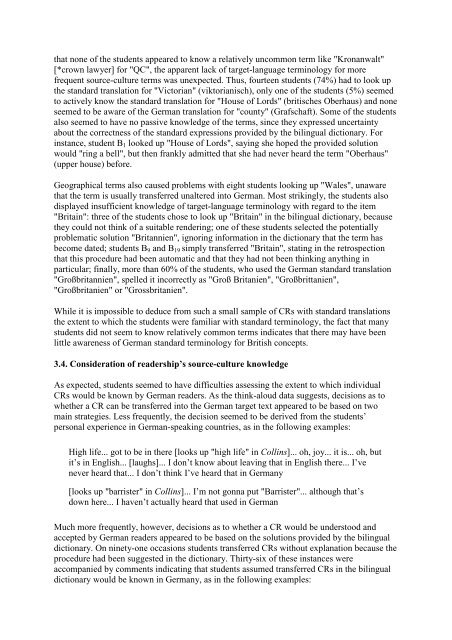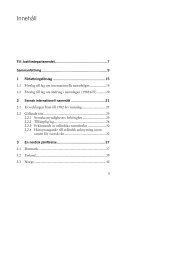Translation, Cultural Knowledge and Intercultural Competence
Translation, Cultural Knowledge and Intercultural Competence
Translation, Cultural Knowledge and Intercultural Competence
You also want an ePaper? Increase the reach of your titles
YUMPU automatically turns print PDFs into web optimized ePapers that Google loves.
that none of the students appeared to know a relatively uncommon term like "Kronanwalt"[*crown lawyer] for "QC", the apparent lack of target-language terminology for morefrequent source-culture terms was unexpected. Thus, fourteen students (74%) had to look upthe st<strong>and</strong>ard translation for "Victorian" (viktorianisch), only one of the students (5%) seemedto actively know the st<strong>and</strong>ard translation for "House of Lords" (britisches Oberhaus) <strong>and</strong> noneseemed to be aware of the German translation for "county" (Grafschaft). Some of the studentsalso seemed to have no passive knowledge of the terms, since they expressed uncertaintyabout the correctness of the st<strong>and</strong>ard expressions provided by the bilingual dictionary. Forinstance, student B 1 looked up "House of Lords", saying she hoped the provided solutionwould "ring a bell", but then frankly admitted that she had never heard the term "Oberhaus"(upper house) before.Geographical terms also caused problems with eight students looking up "Wales", unawarethat the term is usually transferred unaltered into German. Most strikingly, the students alsodisplayed insufficient knowledge of target-language terminology with regard to the item"Britain": three of the students chose to look up "Britain" in the bilingual dictionary, becausethey could not think of a suitable rendering; one of these students selected the potentiallyproblematic solution "Britannien", ignoring information in the dictionary that the term hasbecome dated; students B 9 <strong>and</strong> B 19 simply transferred "Britain", stating in the retrospectionthat this procedure had been automatic <strong>and</strong> that they had not been thinking anything inparticular; finally, more than 60% of the students, who used the German st<strong>and</strong>ard translation"Großbritannien", spelled it incorrectly as "Groß Britanien", "Großbrittanien","Großbritanien" or "Grossbritanien".While it is impossible to deduce from such a small sample of CRs with st<strong>and</strong>ard translationsthe extent to which the students were familiar with st<strong>and</strong>ard terminology, the fact that manystudents did not seem to know relatively common terms indicates that there may have beenlittle awareness of German st<strong>and</strong>ard terminology for British concepts.3.4. Consideration of readership’s source-culture knowledgeAs expected, students seemed to have difficulties assessing the extent to which individualCRs would be known by German readers. As the think-aloud data suggests, decisions as towhether a CR can be transferred into the German target text appeared to be based on twomain strategies. Less frequently, the decision seemed to be derived from the students’personal experience in German-speaking countries, as in the following examples:High life... got to be in there [looks up "high life" in Collins]... oh, joy... it is... oh, butit’s in English... [laughs]... I don’t know about leaving that in English there... I’venever heard that... I don’t think I’ve heard that in Germany[looks up "barrister" in Collins]... I’m not gonna put "Barrister"... although that’sdown here... I haven’t actually heard that used in GermanMuch more frequently, however, decisions as to whether a CR would be understood <strong>and</strong>accepted by German readers appeared to be based on the solutions provided by the bilingualdictionary. On ninety-one occasions students transferred CRs without explanation because theprocedure had been suggested in the dictionary. Thirty-six of these instances wereaccompanied by comments indicating that students assumed transferred CRs in the bilingualdictionary would be known in Germany, as in the following examples:
















